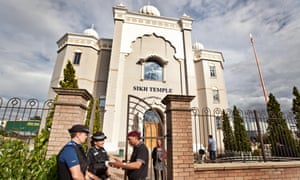Police are accused of overreacting at wedding to what is claimed to be an inter-generational clash

Shamsher Singh, of the Sikh Youth UK group that organised the protest on Sundayagainst an interfaith marriage being carried out as a Sikh ceremony, said it was part of an increasingly active youth movement within the community.
“More and more young people are becoming interested in the true interpretation of what it means to be Sikh,” said Singh. “The elder generation arrived [in the UK] and fitted their faith round the need to assimilate, survive and to get work. This led to a stripping back of the spiritual nature of what it means to be a Sikh to a series of symbols.
“Now younger people want to reclaim Sikhism as a deeply spiritual, peaceful and encompassing religion and this is why we are seeing these protests.”
Armed officers detained 55 men on suspicion of aggravated trespass after being called to the temple in Leamington Spa at about 6.45am on Sunday. On Monday police said all but one of the “bladed weapons” seized were ceremonial.
The Sikh Federation UK, the largest political group representing Sikhs in the UK, called on the police to apologise for its “disproportionate” response. It said those arrested had walked into the temple, or gurdwara, to protest against an interfaith marriage being carried out as a Sikh religious ceremony.
“We stand with those who peacefully protested against the actions of the management committee at Leamington gurdwara,” said a spokesman.
“It now materialises the police were told masked men forced their way into the gurdwara carrying a range of bladed items other than kirpans, that are worn at all times by initiated Sikhs, and it may have been suggested they were holding hostages … This was a small group of young protesters who justifiably objected to an interfaith marriage that was to be carried out as a Sikh religious ceremony.”
The group were described as “fanatical extremists” by one of the trustees of the temple, who said the wedding between a Sikh bride and Hindu groom had been postponed.
Another trustee, Jaswant Virdee, said the intruders were “absolutely wrong” to think that Sikhism prohibited interfaith marriage. “Scripture doesn’t discriminate between anyone,” he said. “The Guru Granth [the Sikh holy book] says every citizen in the world is equal.”
Sikh Youth UK said the protest was entirely peaceful and said those involved had no objection to interfaith marriages, but objected rather to a non-Sikh taking part in the specific religious ceremony at the gurdwara.
“We welcome newly married people of other faiths with open arms at gurdwaras. They can be married elsewhere and we will celebrate with them and shower them with love and welcome them to our community. But the ceremony itself is reserved for Sikhs.”
Shamit Saggar, a professor of politics at the University of Essex and a specialist in British Asian politics, said there was a generational element at work in the Sikh community, with some youth groups becoming increasingly frustrated with the elders.
“We are seeing a rise in Sikh essentialism among some of the youth groups. Whether it is about marrying outside the religion or issues of the theological interpretation, there are growing tensions between the generations.”
He said the problem was more pronounced in the Midlands than in other Sikh communities across the country.
“It is partly explained by education. The more education someone has, the more they are likely to integrate. Conversely, the less educated they are, the greater is the attraction of Sikh essentialism – trying to prove they are more Sikh than others within the community.”





